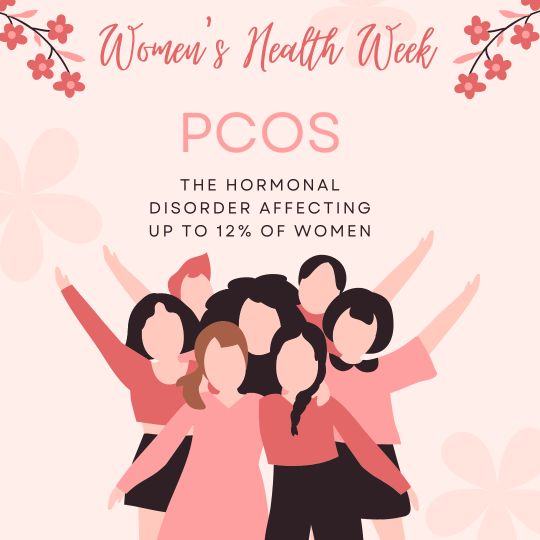8-14 May is Women’s Health Week so it’s a good time to shine the spotlight on Polycystic Ovary Syndrome (PCOS).
PCOS is now recognized as perhaps the most common of all hormone disorders affecting women. It is sometimes called Polycystic Ovary Disorder (PCOD.)
Polycystic Ovary Syndrome is a hormonal imbalance linked to the way the body processes insulin.
Having PCOS can create:
- Irregular menstruation (fewer than eight cycles per year)
- Infertility
- Excess facial/body hair
- Elevated male hormone levels
- Ovarian cysts
- Obesity
- Acne
- Elevated Lipids (Cholesterol and Triglycerides)
- Heart Disease
- Endometrial Cancer
- Adult-onset diabetes.
Scientists at the National Institutes of Health, Stanford University and other research centers have clearly identified the existence and effects of Insulin Resistance as the cause of PCOS.
What is Insulin Resistance?
Your body breaks down foods into a sugar (glucose) which then enters your blood stream. The more sugar and carbohydrates you eat, the higher your blood sugar goes. The higher the blood sugar the more your body produces insulin.
Insulin’s job is to push the blood sugar into the cells.
On the surface of the cells in your body are insulin receptors, which act like little doors that open and close to regulate the inflow of blood sugar.
After many years of consuming a high sugar and high carbohydrate diet, your cells have been bombarded with so much insulin that these doors begin to malfunction and shut down.
With less doors open your body needs to produce even more insulin to push the glucose into the cells. More insulin causes even more doors to close and as this vicious cycle continues, the condition called “insulin resistance“ sets in.
This insulin resistance can get so bad that your body can no longer produce enough insulin to push the blood sugar into the cells. The blood sugar then rises out of control resulting in type 2 diabetes. Diabetes is simply an extreme case of Insulin Resistance.
Why does it cause PCOS?
Insulin Resistance leads to having high insulin levels in the blood. The ovaries seem to be particularly sensitive to this.
The high levels of insulin in the blood stimulate the ovaries to produce large amounts of male hormones which may prevent the ovaries from releasing eggs, thus causing infertility.
This response of over producing male hormones (androgens) causes the PCOS symptoms such as excessive hair growth, male pattern baldness and acne.
This upsets the delicate balance of hormones which has a direct effect on weight gain and the formation of ovarian cysts.
What can you do to manage PCOS?
The best way to manage the symptoms of PCOS is to manage insulin resistance.
Diet and exercise can help you manage insulin resistance naturally.
Diet
A high carbohydrate diet is not the diet that our bodies evolved with. Genetically, our bodies are designed to respond to nutrition from meat, fat and plants. However, one of the reasons humans have been successful in adapting to changing environments is because the human body can also use carbohydrates to survive on an emergency basis.
For about the last 80 years the consumption of simple carbohydrates, sugar, and processed foods in the average diet has skyrocketed. Our bodies have increasingly been using carbohydrates for energy and that has led to increased Insulin Resistance and weight gain.
The best diet to counter Insulin Resistance focuses on gaining nutrition from meats, plants and healthy fats, and reduces the amount of carbohydrates and refined sugar eaten.
Regular Exercise
Exercise will help support your dietary efforts to reduce Insulin Resistance.
Suggested exercise is:
- Low-intensity cardio workouts such as walking, cycling, jogging, recreational sports, or swimming. Walking just 30 minutes a day can be beneficial to overall health.
- Strength training exercises such as weightlifting (fewer reps with lighter weights).
Nutritional Support
Anyone who has Insulin Resistance will most likely have a nutrient deficiency. The answer to this is to provide the body with the correct type and amounts of vitamins, minerals, antioxidants and phytonutrients through nutrient-rich foods and supplementation.
Nutritional supplements allow you to give the body nutrition without any calories. It is virtually impossible to consume all the nutrition your body needs via food while keeping your weight under control.
The ideal supplements provides natural, whole food nutrition with ingredients that are specifically selected to address Insulin Resistance. They must provide targeted nutrition at the cellular level.
The right supplements for Insulin Resistance will help your cells process sugar and reduce the excess sugar and insulin in your blood stream.

